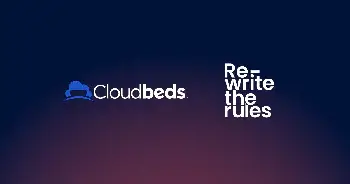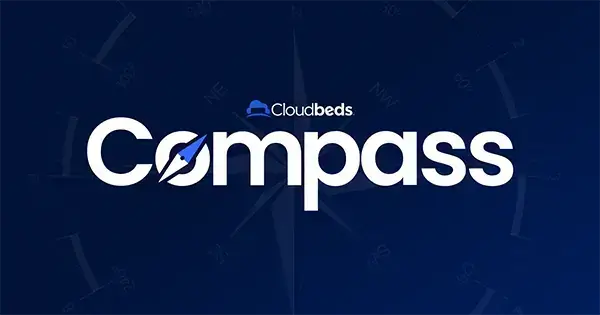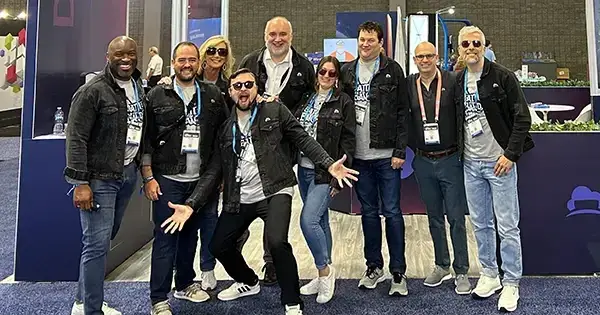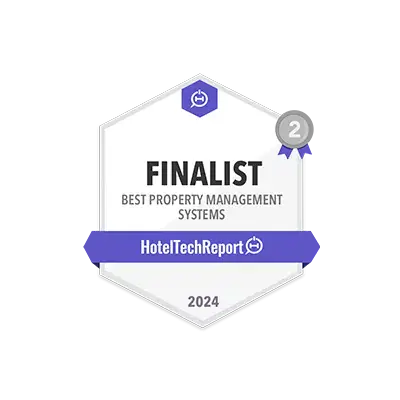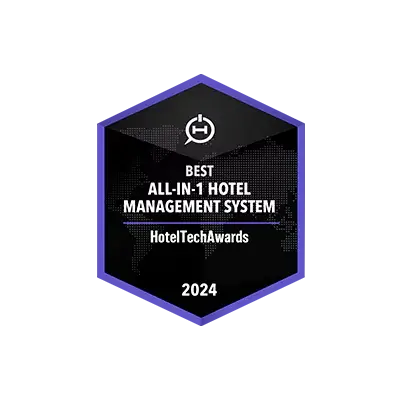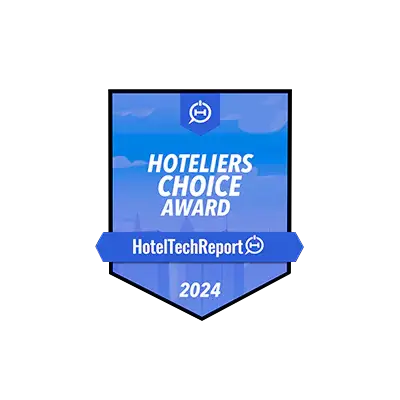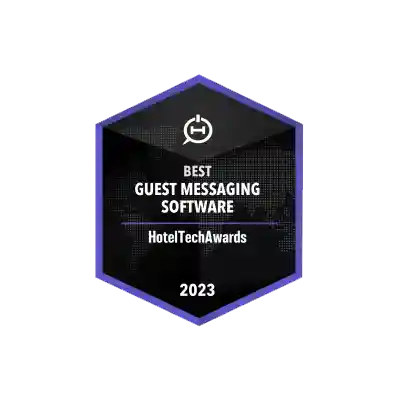How to run a successful
lodging business
Do you have what it takes to operate a thriving hotel? The role of a property owner can be extremely hands-on or completely hands-off. That will depend on how involved you want to be, the confidence you have in your team, and the technology you use.
In either scenario, to provide the leadership and support your team needs to be successful, you’ll need a solid understanding of how hotels operate.
Here, we break down the three main operational models, how hotels are typically structured, and the range of technology solutions that form the backbone of a modern, efficient property.
3 management options
There are many different models for operating a hotel, but most properties fall under one of the following three categories.
Independent business
This type of hotel is owner-operated. This model is a good fit for owners who want to be involved in day-to-day operations and prefer to maintain full control over the hotel’s brand identity and operating standards.
Since independent hotels aren’t operated by professional management companies or affiliated with well-known brands, a lot more work may be required to establish policies and procedures, build awareness, and generate bookings.
Some owners of independent hotels are very involved in day-to-day operations, but most allow the management team they’ve hired to run the property on their own, holding weekly or monthly ownership meetings and lending guidance and support where needed.
A typical day in the life of an owner of an independent property might involve the following activities:
9 a.m. Review the weekly arrivals report to see who’s expected and flag VIPs
10 a.m. Meet with the management team for the weekly performance review
1 p.m. Meet with the HR manager and general manager to review updates to the employee manual
3 p.m. Conduct a tour of the property to plan capital expenditures for the coming year
6 p.m. Entertain a visiting travel journalist over dinner
Management company
This type of hotel is operated by a third-party management company. The company may be a large conglomerate that operates multiple brands, like Wyndham or Hilton, or a small, regional company that operates a handful of local properties.
Using a third-party management company is a good fit for an owner who has limited hospitality experience and prefers to delegate day-to-day operations to experienced professionals. Managed hotels benefit from the turnkey structure and operational expertise of the operating company, which provides support materials like standard operating procedures and training manuals.
A typical day in the life of the owner of a property operated by a management company might involve the following activities:
9 a.m. Reviewing the daily flash report of the previous day’s performance
11 a.m. Visiting the property to meet with a candidate to replace the outgoing general manager
1 p.m. Reviewing updates to the management company’s privacy policy with the general manager to ensure compliance
2 p.m. Reviewing the proposed budget for the coming year with the financial controller
4 p.m. Calling in to a meeting of regional owners of properties overseen by the management company
Franchise hotels
In this model, the hotel pays a franchiser for permission to use its brand name, reservations network, operating manuals, and other support materials. Franchisers typically operate well-known brands such as IHG’s Holiday Inn and Choice Hotels’ Quality Inn or “soft brands” like Marriott’s Autograph Collection, which have looser brand compliance requirements.
A franchise agreement is a good fit for owners who want a certain degree of independence in the management of the property but also want to benefit from the awareness, trust, and support systems provided by a reputed brand.
A typical day in the life of the owner of a franchise property might involve the following activities:
9 a.m. Reviewing the daily arrivals list and flagging elite members of the brand’s loyalty program for preferred treatment
11 a.m. Touring the property with a representative from the franchise company to ensure compliance with brand standards
1 p.m. Reading recent reviews of the property on the franchise website or review dashboard
2 p.m. Reviewing an invoice for monthly fees from the franchiser
4 p.m. Calling in to a meeting of regional owners of other franchise hotels affiliated with the same brand
What (and who) it takes to run a lodging business
Hotels are divided into “the front of the house” (public areas where staff interact with guests, like the front desk, restaurant, and meeting rooms) and “the back of the house” (private areas that guests don’t see, like the kitchen, service corridors, and storage areas).
In the typical hotel organizational chart, employees make up the bulk of staff, reporting to managers or department heads, who in turn report to the general manager (GM). The GM reports to the owner (and management company, if applicable).
The number of departments in a hotel can vary according to the size, style, and structure of the property, as can job titles, roles, and duties. Technology also plays a fundamental role in supporting operations across departments to automate tasks, improve efficiency, and deliver a more seamless guest experience.
Here we’ve broken down the main departments and responsibilities in a standard full-service hotel, along with the technology needed to support each.
Front office.
The front office department is where employees welcome guests, check them in and out, help with luggage, and take care of their needs during their stay. Employees include the front office manager, front desk staff, and guest services staff.
Front office and operations technology:
- Property management system (PMS)
- Mobile check-in app
- Keycard systems and keyless room entry software
- Facilities and operations software
- Guest engagement software
- Guest feedback management software
- Payment processing system
- Staff collaboration software
- Chatbots and web chat applications
- Guest loyalty management software
Housekeeping.
The housekeeping department takes care of the cleaning and upkeep of guestrooms, public spaces, and back-of-house areas in the hotel. Employees include the housekeeping manager, room attendants, and public area attendants.
Housekeeping technology:
- Housekeeping management software
Maintenance.
The maintenance department takes care of facilities and equipment, including the HVAC system (heating, ventilation, air conditioning), mechanical room, and grounds, as well as safety policies, maintenance, and repairs. Employees include the chief engineer and maintenance attendants.
Maintenance technology:
- Maintenance management software
- Energy management software
Food & beverage.
The food and beverage department oversees the planning, preparation, and delivery of food and beverage services, including the restaurant, bar, kitchen, catering, and room service. Employees include the F&B manager, outlet managers, servers, hosts, bus persons, and kitchen staff.
Food and beverage technology:
- Point of sales system (POS)
- Reservations management software
- Mobile food ordering app
- Digital menus
- Kitchen display systems
- Inventory control applications
Sales, marketing, and revenue management.
The sales, marketing, and revenue management department(s) is responsible for all commercial activities, including branding and promotions, inventory, pricing, reservations, and distribution, as well as group, leisure, and corporate sales.
Sales, marketing, and revenue management technology:
- Central reservations system (CRS)
- Channel manager
- Website booking engine
- Rate shopping tool
- Revenue management system (RMS)
- Customer relationship management system (CRM)
- Digital marketing solution
Human resources.
The human resources department is responsible for the hiring, training, development, and retention of hotel staff. Employees include the human resources manager and HR assistants.
Human resources technology:
- Applicant tracking software
- Employee engagement software
Accounting.
The accounting department is responsible for functions related to accounting and financing, including preparation of the annual budget, monthly forecasts, financial reports, accounts receivable and payable, and purchasing and payroll. Employees include the controller and accounting clerks.
Accounting technology:
- Accounting software
- Payroll software
- Invoicing software
- Government reporting software (guest lists, invoicing, taxation, etc.)
The best way to operate: An integrated platform
As you can see, it takes a lot of labor and technology to run a hotel. Today, the average hotel uses 20 different technology solutions to run their business. Thankfully, it doesn’t have to be that way. Instead of relying on a host of siloed technology solutions with different vendors and limited integration capabilities, modern properties should take advantage of an integrated hospitality platform. These platforms bring together all of the tools you need to operate into one system to streamline operations and increase efficiency. These platforms offer lodging operators access to a marketplace, with additional tools connected via an API, so that you can add on functionality as needed.
To see the full range of integration options, check out the Cloudbeds Marketplace.
7 tips for running a lodging business successfully
A hotel is a highly complex and multifaceted operation with all sorts of moving parts. But it all starts with nailing down the essentials.
1. Have a strong vision and direction
Strong leadership is key to keeping staff motivated and focused on common goals. Identify your company vision and values, service culture, and expectations, and integrate them into the daily operations of your property.
2. Hire (and retain) the right people
Hiring and retaining skilled staff has become increasingly challenging in this time of labor shortages. Attracting good candidates and keeping them happy and loyal requires a competitive compensation package, an appealing work culture, development opportunities, and recognition for achievements.
3. Establish strong operational policies and procedures (SOPs)
Establish standard operating procedures (SOPs) and provide the training, support, and empowerment that team members need to take care of guests’ needs, operate technology to its full capabilities, and resolve problems efficiently.
4. Invest in the guest experience
Hotels can attract guests with special offers, but it’s the guest experience that will bring them back. It starts with the basics — a warm welcome, a clean room, and a comfortable bed — and extends to the efficiency of service, the quality of meals, and the ambiance of the property.
5. Ask for guest feedback often
Don’t wait for guests to leave a review online. Be proactive about asking guests for feedback during their stay and sending a post-stay survey after they leave. Respond to feedback and share it with the team, resolving issues to prevent recurring complaints, and recognizing employees for positive comments.
6. Use (the right) technology to simplify operations
Take advantage of the many tools and applications available today to automate tasks, save time, streamline operations, and drive revenue. Always be on the lookout for ways to leverage technology to do things more efficiently and better serve your guests.
7. Review reports to help make decisions
Another advantage of technology is the abundance of data and reporting available to help hotel owners and operators keep their finger on the pulse of operations and performance. This includes everything from daily guest arrival reports to payment reconciliation to month-end financials.
With the right leadership, team, technology, and procedures in place, hotel owners will have everything they need to run a successful hotel.

